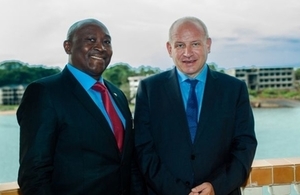UKAid Lights up rural Sierra Leone
Sierra Leone's Rural Renewable Energy Project, funded by UK Aid, will benefit almost 400,000 by using solar energy to tackle energy poverty.

Sierra Leone's Minister of Energy and the British High Commissioner at the launch
In Sierra Leone, 90% of households do not have electricity. Un-electrified, mainly rural, areas of Sierra Leone primarily use small diesel or petrol generators and kerosene to meet their energy needs. This costs far more than energy in urban areas which benefit from grid connection and subsidised tariffs. This also limits opportunities for rural people to use modern technology to access information; to light their homes without polluting the air and harming their health, and their ability to use electric motors to pump clean drinking water from source. Savings achieved through eliminating the use of kerosene have been shown to enable children to attend school one year longer.
Most public buildings in rural areas, for instance health clinics, lack connectivity to the electricity grid, or have unreliable supply. This means there is insufficient lighting for obstetric and other care at night – and it is difficult to maintain cold storage for essential medicines. During Sierra Leone’s Ebola outbreak, the lack of reliable power generation was a major obstacle to the country’s ability to both deal with and quickly recover from the emergency.
Sierra Leone’s Minister of Energy, the Department for International Development (DFID – known in country as ‘UK Aid’) and UNOPS gathered this week at the first steering committee meeting to launch the Rural Renewable Energy Project. Over the next four years half a million people will benefit from at least 90 mini-grids powered with renewable energy. Initially 50 communities, including their health centers, will be electrified in 2017 using mini-grids that will be operated by local entrepreneurs.
“Off-grid renewable energy is the future for countries like Sierra Leone,” said Henry Macauley, Sierra Leone’s Minister of Energy, at the launch of the country’s largest decentralised renewable energy project, funded by UK Aid, aid from the British people, in cooperation with UNOPS.
“Our country suffered greatly during the Ebola crisis,” Macauley continued. “This project will increase accessibility to renewable electricity services and enhance economic growth in underserved rural communities. It will also allow us to better respond to future health emergencies by providing much needed electricity to community health centers, paving the way to universal access to basic services.”
Speaking at the event, Guy Warrington, British High Commissioner to Sierra Leone, said: “The UK Government launched an ambitious Energy Africa campaign in 2015. This aims to help Africa achieve universal energy access by 2030.”
“Sierra Leone can be proud that it was the first country to sign an Energy Africa compact with the UK establishing our common goals,” he continued. “Improving access to energy is also a key Presidential Recovery Priority. I am delighted that UK Aid is able today to pledge £34.5 million to improve rural electrification in support of the Government of Sierra Leone’s efforts to improve energy access for rural communities as part of our £240 million commitment to the recovery.”